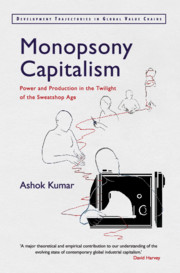Book contents
- Frontmatter
- Dedication
- Contents
- List of Figures
- Acknowledgements
- Introduction: The Enduring Age of the Sweatshop
- PAST
- PRESENT
- 3 China: A Strike at a Giant Footwear Producer
- 4 India: A Warehouse Workers’ Struggle at a ‘Full-Package’ Denim Firm
- 5 Honduras: A Transnational Campaign at a Cotton Commodity Producer
- FUTURE
- Conclusion: The Twilight of the Sweatshop Age?
- Bibliography
- Index
4 - India: A Warehouse Workers’ Struggle at a ‘Full-Package’ Denim Firm
from PRESENT
Published online by Cambridge University Press: 15 January 2020
- Frontmatter
- Dedication
- Contents
- List of Figures
- Acknowledgements
- Introduction: The Enduring Age of the Sweatshop
- PAST
- PRESENT
- 3 China: A Strike at a Giant Footwear Producer
- 4 India: A Warehouse Workers’ Struggle at a ‘Full-Package’ Denim Firm
- 5 Honduras: A Transnational Campaign at a Cotton Commodity Producer
- FUTURE
- Conclusion: The Twilight of the Sweatshop Age?
- Bibliography
- Index
Summary
Established in 1931, Arvind Mills, along with thousands of other producers, was born out of the demand for domestically produced fabric, part of Mahatma Gandhi's call for the boycott of imported fabric, or the ‘Swadeshi Movement’. Arvind emerged as the sole survivor among 85 textile mills that made their home in Ahmedabad three decades ago entirely as a consequence of their decision to transform from a multi-product company to primarily a denim manufacturer. Until 1987, all available denim in India was imported. That year, Arvind became the first mill in the country to produce denim, a key initiator and beneficiary of India's ‘denim revolution’.
Here, I explore the factors in India that led to the growth and concentration of denim, a less volatile section of the garment sector that due to limited seasonality and fashion-sensitivity valorize faster than others (like footwear and cotton commodity production). To understand this phenomenon, I look at the struggle at a denim warehouse owned by Bangalore-based Arvind Group (hereinafter ‘Arvind’). What we see is a transformation of relations in the sector between buyers and sellers, producers and consumers, and workers and bosses.
The case is but one demonstration of how the phase-out of the MFA brought with it an end to the regime of ‘comprador capital’ that had dominated Indian economic life from the early post-colonial days, allowing indigenous firms to piggyback on foreign corporations seeking access to cheap labour and raw materials. The post-MFA era has seen global competition weaken and the autonomy of smaller firms across the globe gradually removed altogether, leaving many to be absorbed into larger rivals, forced to merge, or simply vanish into the red. What remains, in a handful of countries, are a handful of mega mega-suppliers, powerful enough to corner the supply chains of specialized products and intensify supplier-end value capture. Meanwhile, large retailer/brand oligopolies simultaneously benefit from growing profits brought on by economies of scale and integration, while becoming gradually dependent on increasingly oligopolistic suppliers. Thus, the ‘buyer-driven’ character of the value chain gives way to a kind of ‘buyer–producer symbiosis’. In consequence, as we observe in the case of Arvind, labour's resistance adapts as well.
- Type
- Chapter
- Information
- Monopsony CapitalismPower and Production in the Twilight of the Sweatshop Age, pp. 120 - 143Publisher: Cambridge University PressPrint publication year: 2020



